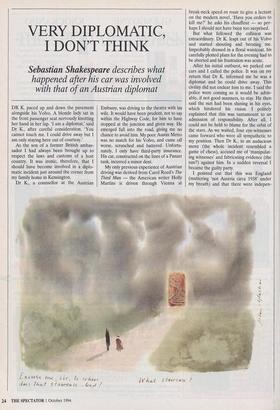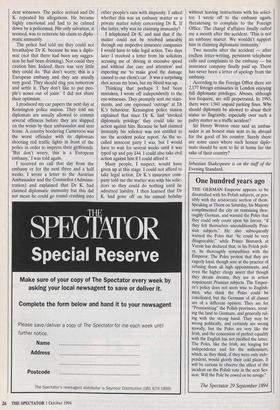VERY DIPLOMATIC, I DON'T THINK
Sebastian Shakespeare describes what
happened after his car was involved with that of an Austrian diplomat
DR K. paced up and down the pavement alongside his Volvo. A blonde lady sat in the front passenger seat nervously knotting her hand in her lap. 'I am a diplomat,' said Dr K., after careful consideration. 'You cannot touch me. I could drive away but I am only staying here out of courtesy.'
As the son of a former British ambas- sador I had always been brought up to respect the laws and customs of a host country. It was ironic, therefore, that I should have become involved in a diplo- matic incident just around the corner from my family home in Kensington.
Dr K., a counsellor at the Austrian Embassy, was driving to the theatre with his wife. It would have been prudent, not to say within the Highway Code, for him to have stopped at the junction and given way. He emerged full into the road, giving me no chance to avoid him. My poor Austin Metro was no match for his Volvo, and came off worse, scrunched and battered. Unfortu- nately, I only have third-party insurance. His car, constructed on the lines of a Panzer tank, incurred a minor dent.
My only previous experience of Austrian driving was derived from Carol Reed's The Third Man — the American writer Holly Martins is driven through Vienna at break-neck speed en route to give a lecture on the modern novel. 'Have you orders to kill me?' he asks his chauffeur — so per- haps I should not have been too surprised.
But what followed the collision was extraordinary. Dr K. leapt out of his Volvo and started shouting and berating me. Improbably dressed in a floral waistcoat, his carefully plotted plans for the evening had to be aborted and his frustration was acute.
After his initial outburst, we parked our cars and I called the police. It was on my return that Dr K. informed me he was a diplomat and he could drive away. This civility did not endear him to me. I said the police were coming so it would be advis- able, if not good manners, to stay. He then said the sun had been shining in his eyes, which hindered his vision. I politely explained that this was tantamount to an admission of responsibility. After all, I could not be held to blame for the orbit of the stars. As we waited, four eye-witnesses came forward who were all sympathetic to my position. Then Dr K., in an audacious move (the whole incident resembled a game of chess), accused me of 'manipulat- ing witnesses' and fabricating evidence (the sun?) against him. In a sudden reversal I became the guilty party.
I pointed out that this was England (muttering 'not Austria circa 1938' under my breath) and that there were indepen- dent witnesses. The police arrived and Dr K. repeated his allegations. He became highly emotional and had to be calmed down by a policeman. His only salvation, it seemed, was to reiterate his claim to diplo- matic immunity.
The police had told me they could not breathalyse Dr K. because he was a diplo- mat (not that there had been any sugges- tion he had been drinking). Nor could they caution him. Indeed, there was very little they could do. 'But don't worry; this is a European embassy and they are usually very good. They should ring you tomorrow and settle it. They don't like to put peo- ple's noses out of joint.' I did not share their optimism.
I produced my car papers the next day at Kensington police station. They told me diplomats are usually allowed to commit several offences before they are slapped on the wrists by their ambassador and sent home. A country bordering Cameroon was the worst offender with its diplomats shooting red traffic lights in front of the police in order to impress their girlfriends. `But don't worry, this is a European embassy,' I was told again.
I received no call that day from the embassy or for the next three and a half weeks. I wrote a letter to the Austrian Ambassador and the Counsellor (Adminis- tration) and explained that Dr K. had claimed diplomatic immunity but this did not mean he could go round crashing into other people's cars with impunity. I asked whether this was an embassy matter or a private matter solely concerning Dr K. If the latter, why was he claiming immunity?
I telephoned Dr K. and said that if the matter could not be resolved amicably through our respective insurance companies I would have to take legal action. Two days later I received a letter from his solicitors accusing me of 'driving at excessive speed and without due care and attention' and expecting me 'to make good the damage caused to our client's car'. It was a surprising shot across my bows, but my blood was up.
Thinking that perhaps I had been mistaken, I wrote off independently to the eye-witnesses. They promptly sent me state- ments, and one expressed 'outrage' at Dr K's behaviour. Kensington police station explained that since Dr K. had 'invoked diplomatic privilege' they could take no action against him. Because he had claimed immunity his solicitor was not entitled to see the accident police report. As the so- called innocent party I was, but I would have to wait for several weeks until it was typed up and pay £44. I could also take civil action against him if I could afford it.
Many people, I suspect, would have given up at this stage. I could not afford to take legal action. Dr K's insurance com- pany told me the matter was with his solic- itors so they could do nothing until he admitted liability. I then learned that Dr K. had gone off on his annual holiday without leaving instructions with his solici- tor. I wrote off to the embassy again, threatening to complain to the Foreign Office. The chargé d'affaires finally called me a month after the accident. 'This is not an embassy matter. We wouldn't support him in claiming diplomatic immunity.'
Two months after the accident — after endless letter-writing, persistent telephone calls and complaints to the embassy — his insurance company finally paid up. There has never been a letter of apology from the embassy.
According to the Foreign Office there are 2,177 foreign emissaries in London enjoying full diplomatic privileges. Abuses, although less frequent, are still perpetrated. In 1993, there were 1,941 unpaid parking fines. Why should diplomats be allowed to abuse their status so flagrantly, especially over such a paltry matter as a traffic accident?
Sir Henry Wotton once said an ambas- sador is an honest man sent to lie abroad for the good of his country. Surely there are some cases where such honest diplo- mats should be sent to lie at home for the sake of their country?
Sebastian Shakespeare is on the staff of the Evening Standard.



























































 Previous page
Previous page